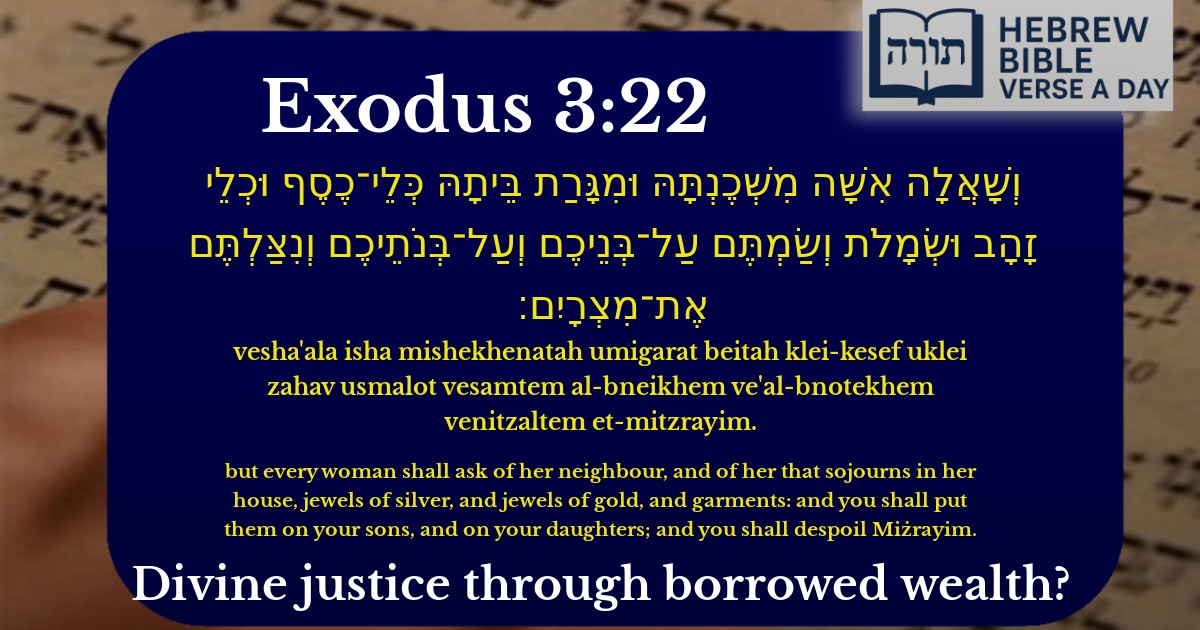Join Our Newsletter To Be Informed When New Videos Are Posted
Join the thousands of fellow Studends who rely on our videos to learn how to read the bible in Hebrew for free!
Hebrew Text
וְשָׁאֲלָה אִשָּׁה מִשְּׁכֶנְתָּהּ וּמִגָּרַת בֵּיתָהּ כְּלֵי־כֶסֶף וּכְלֵי זָהָב וּשְׂמָלֹת וְשַׂמְתֶּם עַל־בְּנֵיכֶם וְעַל־בְּנֹתֵיכֶם וְנִצַּלְתֶּם אֶת־מִצְרָיִם׃
English Translation
but every woman shall ask of her neighbour, and of her that sojourns in her house, jewels of silver, and jewels of gold, and garments: and you shall put them on your sons, and on your daughters; and you shall despoil Miżrayim.
Transliteration
Vesha'ala isha mishekhenatah umigarat beitah klei-kesef uklei zahav usmalot vesamtem al-bneikhem ve'al-bnotekhem venitzaltem et-mitzrayim.
Hebrew Leining Text
וְשָׁאֲלָ֨ה אִשָּׁ֤ה מִשְּׁכֶנְתָּהּ֙ וּמִגָּרַ֣ת בֵּיתָ֔הּ כְּלֵי־כֶ֛סֶף וּכְלֵ֥י זָהָ֖ב וּשְׂמָלֹ֑ת וְשַׂמְתֶּ֗ם עַל־בְּנֵיכֶם֙ וְעַל־בְּנֹ֣תֵיכֶ֔ם וְנִצַּלְתֶּ֖ם אֶת־מִצְרָֽיִם׃
וְשָׁאֲלָ֨ה אִשָּׁ֤ה מִשְּׁכֶנְתָּהּ֙ וּמִגָּרַ֣ת בֵּיתָ֔הּ כְּלֵי־כֶ֛סֶף וּכְלֵ֥י זָהָ֖ב וּשְׂמָלֹ֑ת וְשַׂמְתֶּ֗ם עַל־בְּנֵיכֶם֙ וְעַל־בְּנֹ֣תֵיכֶ֔ם וְנִצַּלְתֶּ֖ם אֶת־מִצְרָֽיִם׃
🎵 Listen to leining
Parasha Commentary
📚 Talmud Citations
This verse is quoted in the Talmud.
📖 Berakhot 9b
The verse is referenced in a discussion about the Israelites' exodus from Egypt and the commandment to ask for valuables from the Egyptians, highlighting the fulfillment of God's promise to Abraham that his descendants would leave Egypt with great wealth.
📖 Sanhedrin 91a
The verse is cited in a debate about the righteousness of the Israelites' actions in despoiling the Egyptians, with some sages justifying it as repayment for unpaid labor.


Context of the Verse
This verse (Shemot 3:22) appears in the context of Hashem's instructions to Moshe at the burning bush regarding the future Exodus from Mitzrayim. The command for Bnei Yisrael to request silver, gold, and garments from their Egyptian neighbors is part of the fulfillment of the Brit Bein HaBetarim (Covenant Between the Parts), where Avraham was told his descendants would leave their exile with great wealth (Bereishit 15:14).
Rashi's Explanation
Rashi explains that the phrase "וְנִצַּלְתֶּם אֶת־מִצְרָיִם" ("and you shall despoil Mitzrayim") refers to collecting the wealth of Egypt as compensation for the unpaid labor of Bnei Yisrael during their enslavement. He cites the Midrash (Shemot Rabbah 14:3) that compares this to a prisoner who is freed and compensated for his forced labor.
Rambam's Perspective
In Moreh Nevuchim (3:39), Rambam notes that this command served a psychological purpose - by taking Egyptian wealth, Bnei Yisrael would feel they were leaving as conquerors rather than as escaped slaves, thereby strengthening their national confidence.
Midrashic Insights
Halachic Considerations
The Mechilta (Bo, Masechta DePischa 13) derives from this verse that it was permissible to borrow these items without intent to return them, as this was Divinely sanctioned compensation. However, this was a unique circumstance that doesn't establish a general halachic precedent.
Symbolic Meaning
The Kli Yakar suggests that the silver, gold and garments represent different levels of spiritual refinement - the material wealth taken from Egypt would later be transformed into the materials used for building the Mishkan, elevating physical objects for holy purposes.